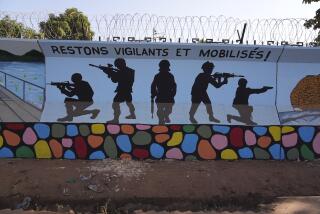NEWS ANALYSIS : Ineffectual Protectors Share Dejection of Besieged Bosnians
- Share via
SARAJEVO, Bosnia-Herzegovina — It might as well have been a gallows that French troops erected when they repositioned metal barriers between the shell-pocked Hapsburg buildings of Marijin Dvor to protect defenseless strollers from Serbian sniper fire.
For nearly two months, it had been reasonably safe to walk across the historic central district that is now one of the Bosnian war’s many wastelands. The threat of NATO air strikes in February had cowed the Serbian nationalist sharpshooters into compliance with a shaky but inspiring cease-fire.
But since the U.N. Protection Force last week laid bare its helplessness in collapsing Gorazde, Serbian gunmen have brazenly resumed their campaign of terror against civilians, piercing the silence with the crack of rifle fire directed at pedestrians and shattering illusions that Sarajevo was being spared further shelling and fears of conquest.
“We feel now that Sarajevo is not safe anymore. We can only wait and watch for the shelling to begin again,” Jasminka Filipovic, a disillusioned businesswoman, said of the return of mortar, machine-gun and sniper fire. “We are all rather depressed because we have lost hope once again.”
Secretaries making their way to work must again dodge and dart through the blighted landscape. Children have been recalled to inner courtyards for fear of bombs and bullets tearing through the streets.
Water, electricity and gas--unaccustomed luxuries until two months ago--are once again switched on and off at the whim of encircling rebels.
Bosnians thought they were inured to hardship and had become deeply cynical after two years of siege and of indifference from the outside world. But, confronted with the harsh reality of being finally and willfully abandoned in Gorazde, they have been surprised to find reserves in what they thought was an exhausted capacity for disappointment.
They find little comfort in the fact that they are not alone in their dejection. Nor is there solace to be found in their tiny country’s tragedy having shaken the conscience of the civilized world.
That U.N. troops are now hostages--as much as Sarajevans are--is no cause for compassion. After two years of enduring the Serbs’ daily deliveries of horror and degradation, even the educated and once-tolerant people of Sarajevo have lost all sense of pity.
No one revels in the troops’ suffering. But neither are many disturbed by it. A taste of their own bad medicine is the way most view the ineffectual disaster the peacekeeping mission has made for itself.
“For the first time, these troops are in the same position as the Bosnian people. They now know what it’s like to be surrounded by tanks and artillery and have no means of defending yourself,” said Edvin Ferizovic, a noted violinist and conductor who traveled widely before the siege began.
The handful of foreign diplomats posted to Sarajevo, U.N. troops who wanted to make a difference, aid workers and journalists who ignored personal risk to work in the war zone--all now find themselves consumed by morose soul-searching over what the past two years of work have been for.
“I’m not very proud to be a peacekeeper today,” a French officer said, wavering between shame and outrage at the mission’s ignominious retreat. “There are all of five tanks attacking Gorazde, and before this ‘force’ the whole world trembles.”
A Western diplomat, stunned by the international community’s apparent willingness to abandon Bosnian civilians to the marauding rebels, shook his head in disbelief, conceding, “It’s all over.”
While the Serbian nationalist steamroller still has a few unconquered enclaves to flatten en route to creating a Greater Serbia, an atmosphere of defeat has pervaded this ruined capital as the U.N. mission has made unmistakably clear that it would make no move to prevent the fall of Gorazde. One of six U.N.-designated safe areas created to subdue pressure for military intervention a year ago, Gorazde has come to symbolize the collapse of Western honor in the face of defiant nationalist resolve.
Unchallenged in their chilling assault on refugee-packed shelters, a hospital and the token handful of U.N. troops sent to monitor Gorazde, the rebels are widely expected to rout the largely Muslim enclave and then move on to Zepa and Srebrenica to the north.
And when the Muslim communities have been overrun, many here in this already battered, demoralized capital expect the emboldened conquerors to return for the most desirable morsel.
An appeal to the U.N. Security Council has been made for a mandate that would allow blue-helmeted troops to better protect themselves and Bosnian civilians.
But the slow wheels of the world body’s bureaucracy are unlikely to grind into motion soon enough to give the mission the authority or the means to fulfill its ambitious orders. And the people of Bosnia know the face-saving routine of toothless resolutions all too well.
The 65,000 people of Gorazde have been herded like cattle into the town center and fired on relentlessly to ensure they will be eager to flee when relief agencies are invited by Serbs to rescue the terrified masses. And by moving out the vanquished in an attempt to save their lives, the U.N. troops will be assisting in the reviled rebel program of “ethnic cleansing.”
“We’ve got nothing left to do here but hang our heads in shame,” a British officer said. “We might as well go home now. We’ve done enough damage here.”
More to Read
Sign up for Essential California
The most important California stories and recommendations in your inbox every morning.
You may occasionally receive promotional content from the Los Angeles Times.














